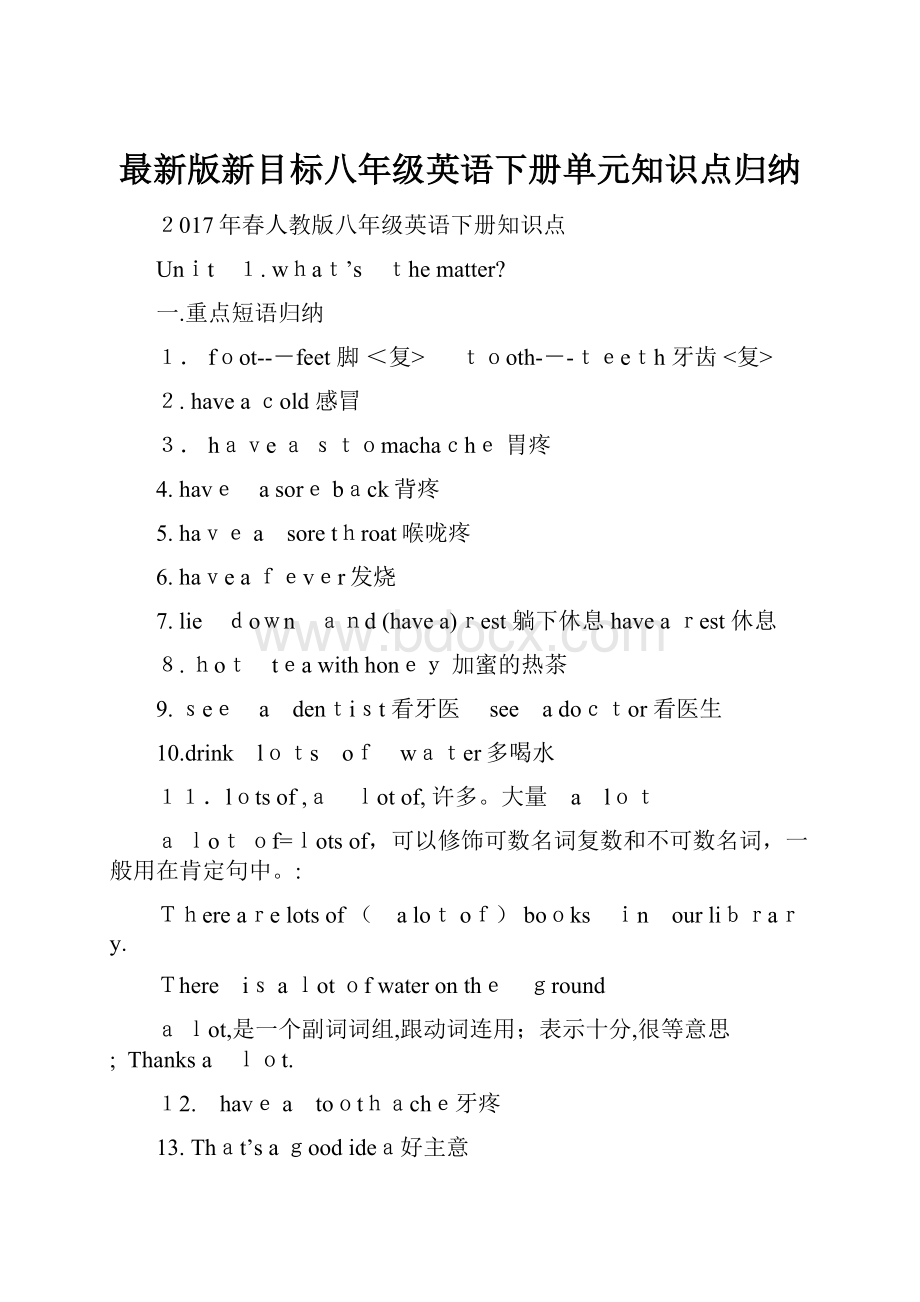最新版新目标八年级英语下册单元知识点归纳.docx
《最新版新目标八年级英语下册单元知识点归纳.docx》由会员分享,可在线阅读,更多相关《最新版新目标八年级英语下册单元知识点归纳.docx(58页珍藏版)》请在冰豆网上搜索。

最新版新目标八年级英语下册单元知识点归纳
2017年春人教版八年级英语下册知识点
Unit 1.what’s thematter?
一.重点短语归纳
1.foot---feet 脚 <复> tooth---teeth 牙齿 <复>
2.haveacold 感冒
3.haveastomachache 胃疼
4.have asoreback背疼
5.havea sorethroat喉咙疼
6.haveafever发烧
7.lie down and(havea)rest 躺下休息havearest 休息
8.hot teawithhoney 加蜜的热茶
9.see a dentist 看牙医 see adoctor看医生
10.drink lots of water多喝水
11.lotsof ,a lotof,许多。
大量 a lot
alotof=lotsof,可以修饰可数名词复数和不可数名词,一般用在肯定句中。
:
Therearelotsof( alotof)books in ourlibrary.
There isalotofwateronthe ground
alot,是一个副词词组,跟动词连用;表示十分,很等意思; Thanksa lot.
12. havea toothache牙疼
13.That’sagoodidea好主意
14.goto bed 去睡觉 gotobedearly 早上床睡觉
15.feelwell感到好 feelill 感到不舒服
Idon’tfeelwell=I’mnotfeelingwell 我感觉不舒服.
16.startdoing/todosth开始做某事
todo 是一件事情完成了,开始做另外一件事情
doing是原来的那件事情做到一半,现在又开始做了,是同一件事情。
17. twodaysago两天前
18. getsomerest 多休息, 休息一会儿
19.I thinkso我认为是这样
20.bethirsty口渴
21.behungry 饥饿
22.be stressedout紧张
23.listentomusic听音乐
24.healthy lifestyle健康的生活方式
25.traditionalChinesedoctors传统中医
26. needtodosth 需要做某事
Ihaveatoothache.Ineed toseeadentist. 我牙痛, 我需要去看牙医.
Weneedtokeepourclassroomclean. 我们需要保持教室的干净.
27. toomuch+ 不可数名词 太多的…
much too +形/副 实在太… 极其,非常
toomany+ 可数名词复数 太多的…
28.begoodfor sth./ doingsth.对什么有益,对什么有好处
bebadforsth./doing sth. 对什么有害
be goodto对…好
begoodat=do well in 在……方面好,擅长
be good(bad) for、be good at的相关用法
1.begoodfor对......有益
Doingmorningexercisesisgoodforyourhealth. 做早操对你们的建康有益。
2.be goodat擅长于......
Li Pingisgood atbasketball.
李平擅长于篮球。
=LiPing isgoodatplayingbasketball.
李平擅长于打篮球。
begood at=do well in如:
I'mgoodat math.= I dowell inmath.
我擅长于数学。
3.be goodto对......好
Parents arealwaysgood totheir children.
父母亲总是对他们的孩子好。
29.getgoodgrades取得好成绩
30.angry用法 be angry withsb生某人的气
Iwas angry withhimforkeepingmewaiting.
我对他很生气,因为他让我等了好久。
beangryat/aboutsth 就某事生气
31.It’s easytodosth做某事是容易的。
It’simportanttodosth.做某事很重要。
32.balanceddiet平衡饮食
33.gettired 感到疲倦be/gettired
34.stayhealthy 保持健康=keep healthy=keepingood health
35.Heshouldn’t eat anything
=Heshouldeatnothing. 他不应当吃任何东西.
36.givesbsomeadvice给某人建议give advice 提出建议
advice是不可数名词
apieceofadvice一则建议 takeone’sadvice 采纳或听从某人的建议
He gave mesomegood advice.
他向我提了一些很好的意见。
49.sleep8hoursa night每晚睡眠八小时,getenoughsleep得到充足的睡眠
50.takemedicine吃药服药
Ihavetotake medicinethreetimesaday formycold.因为感冒,我不得不一天吃三次药。
二固定结构
It’s+形容词 + forsb.+todosth.
做某事对某人来说是…的。
It’simportant todo sth .做某事很重要。
It’s important formetoeatabalanceddiet. 平衡饮食对我来说是很重要的.
It’seasyto do sth做某事是容易的。
It’seasyforus tofind outtheanswer. 找出答案对我们来说是容易的
三.重点句子
1.What’sthe matter?
What’s the mater withyou?
你怎么啦?
=What’s the trouble withyou?
=What’swrongwithyou?
I havea cold/ haveasoreback/havea stomachache
2.That’stoobad.You should/shouldn’t … 那太糟糕了. 你应该/不该…
You should liedownandrest / drinkhot teawith honey/seeadentist/seeadoctor.
Heshouldn’t eat anything =Heshould eatnothing. 他不应当吃任何东西.
3.I’m not fellingwell .这里well表示身体状况,不能用good代替
Idon’tfeelwell=I’m notfeeling well 我感觉不舒服.
4.When diditstart?
Abouttwodaysago.什么时候开始的?
大约两天前
5.Ihopeyoufellbettersoon .我希望你很快好起来
这里better是well的比较级
10.It’seasytohave ahealthylifestyle,andit’simportant toeatabalanceddiet.
有一个健康的生活方式很容易,饮食平衡是很重要的。
→It’seasytodo sth.做某事容易 /It’simportant todo sth.做某事重要
四.知识结构
.情态动词should的用法
should是情态动词,它的基本用法是必须和其他动词一起构成谓语。
情态动词没有人称和数的变化,意为"应该......"。
should(应当,应该)用于所有人称,表示劝告或建议。
eg.Youshouldwaitalittlemore.
你应该再多等一会儿。
---Ihaveaverybadcold.我感冒很厉害。
--- Youshould lie downandhave a rest.你应该躺下,多喝水。
maybe与may be
1.maybe是副词,译为“也许、可能”,相当于“perhaps”。
如:
Maybehecananswerthequestion. 也许他能回答那个问题。
HemaybeisfromtheUSA,too. 他可能也来自美国。
2.maybe中的may为情态动词,译为“可能是......”。
如:
Hemay befromtheUSA,too. 他可能也来自美国。
Shemaybeour English teacher. 她可能是我们的英语老师
few、afew、little、a little的区别和联系:
1.few/afew用来修饰可数名词,few表示否定意义,没有,几乎没有;afew表示有肯定意思,有几个。
例如:
Hehasfew friendshere,hefeelslonely. 他这里没朋友,他感觉寂寞。
Therearea feweggsinthebasket.篮子里有几个鸡蛋。
2.little / alittle用来修饰不可数名词,little表示否定意思,没有,几乎没有。
a little表示肯定意思,有一点儿。
例如:
Thereislittleinkinmybottle,canyougive mealittleink?
我的瓶子里没有墨水了,你能给我点儿墨水吗?
3 not…until 直到…(否定句)才,动词为短暂性或瞬间性动词
She didn’tleaveuntilwecame.
He wentshopping afterhegotup.
=Hedidn’tgoshopping until/beforehegot up.
……until/till 直到···(肯定句)动词为延续性动词
Westayed heretill/until12o’clock.
Unit 2I'llhelpclean the cityparks.
一.知识点:
短语动词小结
常见短语动词结构有下面几种:
1.动词+副词如:
giveup放弃turn off关掉 stayup熬夜
这种结构有时相当于及物动词,如果其宾语是代词,就必须放在动
词和副词之间,如果是名词,则既可插在动词和副词之间,也可放
在短语动词后。
2.动词+介词如:
listenof听lookat 看 belongto属于
这种结构相当于及物动词,后面跟宾语。
3.动词+副词+介词 如:
comeupwith提出,想出
runoutof用完,耗尽
4.动词+名词(介词)如:
takepart in参加catchholdof抓住
1.cheer(sb.) up使(某人)高兴、振作如:
cheermeup使我高兴 cleanup打扫 clean-upn. 打扫
2.homelessadj.无家可归的ahomeless boy一个无家可归的男孩homen. 家
4.sick adj.生病的 作表语、定语 ill adj.生病的作表语,不能作定语
5.volunteer todo v.志愿效劳、主动贡献 volunteern.志愿者
6. comeupwith提出想出===thinkup想出 catchupwith 赶上追上
7.putoff doing 推迟做某事 puton穿上(指过程)putup张贴
8.writedown写下记下 9.callup打电话 makeatelephonecall 打电话
10.setup成立建立
Thenew hospitalwasset upin2000. 这座医院是在2000年成立的。
11.each每个 各自的强调第一个人或事物的个别情况常与of连用
every 每个每一个的一切的则有“全体”的意思不能与of连用
12. put…to use 把… 投入使用,利用
Theyputthe newmachinetouse. 他们把新机器投入使用
13. helpsb.(to)do帮助某人做某事helphim (to) study
helpsb.withsth.帮助某人做某事helphim withEnglish
helpdo 帮助做某事helpstudy
14.planto do计划做某事 plan+从句
I plantogoto Beijing.===Iplan (that)I willgotoBeijing.
我计划去北京。
15.spend…doing花费…做…IspentadayvisitingBeijing.
我花了一天的时间去参观北京。
spend…onsth.花费…在…I spent3 years onEnglish.
16.join参加 (指参加团体、组织) 如:
join theParty入党
takepartin参加(指参加活动) 如:
takepart insportsmeeting 参加运动会
17. runout 与runout of
①runout(becomeusedup). 其主语往往为物。
如时间,食物,金钱,油等,本
身就含有被动意义。
Hismoneysoonranout.他的钱很快就花光了。
Ourtimeisrunningout.我们剩下的时间不多了。
②run out of主语为人,表示主动含义。
Heisalwaysrunningout ofmoneybeforepay day.他总是在发工资的日子还没有到就把钱花完了。
两者在一定条件下可以互换
如:
The petrolisrunning out.汽油快用完了= Wearerunningoutof petrol.我们快把汽油用完了。
Ourtimeisrunningout.我们剩下的时间不多了。
=We arerunningoutof time
18. take after(在外貌、性格等方面)与(父母等)相像
besimilar to与..相像 take after相像
lookafter照顾 takecareof照顾
19.work outv.+ adj.
①结局,结果为
Thestrategies thathecameup withworkedoutfine.他提出的这个策略效果很好。
②算出,制订出,消耗完(精力等)
Henever seemsto beworkedout. 他好像永远不会疲乏似的。
Heworkedoutaplan.他制订了一个计划。
Ihave workedoutourtotalexpenses.我已经算出了我们总的费用。
21.hangout闲荡闲逛
Iliketohangout atmallwithmy friends.我喜欢和我的朋友一起去购物中心闲荡。
22.be ableto do能会beunable todo不能不会
23.thankyou fordoing谢谢做某事如:
thankyouforhelpingme谢谢做帮助我
24.for sure确实如此,毫无疑问
You don’thave money.That’sfor sure.你没有钱,这是毫无疑问的。
25.fill…with…使…充满…用…填充…
She filledthe bowlwith water.她用水填满碗。
26. hand out分发 hand outbananas
giveout分发 giveoutsth tosb.分….给某人
giveupdoing 放弃… giveupsmoking放弃吸烟
give away赠送捐赠giveawaysth.to…. giveawaymoneytokids
givesb. sth.给某人某东西 givememoney给我钱
givesth.tosb.给某人某东西givemoneytome给我线
27.helpsb.out帮助…做事,解决难题(摆脱困境)
Ican’t workoutthis math problem.Pleasehelpmeout.我不能算出这道数学问题,请你帮我解决。
28.trainn.火车 train v.训练
trainsb.todo.训练某人做某事
Shetrainsherdogtofetch things.她训练她的狗去取东西。
29.atonce==rightaway立刻马上如:
Do it atonce. 马上去做。
I’llgothere atonce/right away.我马上去那里。
30.oneday有一天(指将来/过去) someday 有一天(指将来)如:
OnedayI went toBeijing.有一天我去了北京。
SomedayI’llgotoBeijing.有一天我将去北京。
34.disabled adj. 肢体有残疾的disable v.不能
36.volunteer ①可数名词 “志愿者”②adj.自愿的
vi. volunteer todosth
Theyarethe ChinesePeople’s Volunteers. 他们是中国人民志愿军。
Ivolunteerto help you. 我自愿帮助你。
二.句子
1.We can’t put offmakingaplan.Clean-upDayisonlytwoweeksfrom
now.我们不能推迟制订计划,清洁日离现在只有两周了。
2.She putsthis lovetogooduseby workingintheafter-school carecentre atherlocalelementary school.
她在当地的一所小学的课后辅导中心工作,使这个爱好得到较好的利用
3.Notonly doI feelgoodabout helpingotherpeople,but Iget tospend timedoingwhatIlovetodo.
帮助别人不但自己感到快乐,而且我开始花时间做自己喜欢做的事了。
4.The three studentsplanto setupastudentvolunteer project atheirschool.
这三个学生计划在他们校开展一个学生志愿者项目。
5.Healsoputup somesignaskingforoldbikes.他还贴了一些需求旧自行车的告。
6.Thestrategiesthathe cameup withworkedoutfine.几米想出的这个办法很效。
8.Weneedtocomeupwith aplan. 我们需要指定一个计划。
9.Youcouldhelpcleanup thecityparks.你可以帮助打扫城市公园。
10.Henowhassixteenbikestofixupand giveaway tochildrenwho
don’t havebikes. 他现在有16辆要修理的自行车,并准备把这些修好的自行车赠送给那些没有自行车的孩子。
Unit3Couldyouplease cleanyourroom?
一.重要词组及短语
1. couldyoupleasedosth.?
你能……吗?
/请你干……好吗?
2.do thechores做杂务ﻫ3.dothedishes 洗餐具
4.sweepthefloor清扫地板
5. takeoutthetrash倒垃圾
6. makeone'sbed铺床
7.fold one'sclothes 叠衣服
8. cleanthelivingroom 清扫客厅
9.stayoutlate 晚归
10.comeover过来
11. haveatest考试ﻫ12.getaride搭车
13.useone'scomputer使用某人的电脑ﻫ14.hatesth. /hate todosth. /hate doingsth.讨厌某事/做某事
15.dothe laundry=dosomewashing=washclothes洗衣服
17.washthecar刷车
16. makebreakfast /make dinner=dosomecooking做饭
18. work on从事,忙于 workat学习、致力于、在……上下工夫
19. borrowsomemoney借一些钱ﻫ borrowsth.from sb.向某人借某物(借入)
lendsb.